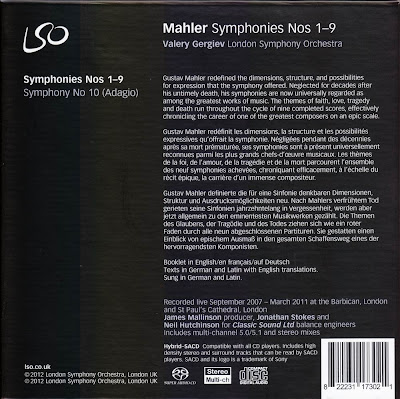Sony PS3 SACD to *ISO | DSD 1bit-2822,4kHz 2.0, 5.0
FLAC 24bit 88.2kHZ 2.0
Classical | Label: LSO | Catalog Number: LSO0730 | RAR 3% Rec.
01.I. Andante comodo27:01
02.II. Im Tempo eines gemächlichen Ländlers - Etwas täppisch und sehr derb15:09
03.III. Rondo Burleske - Allegro assai - Sehr trotzig12:34
04.IV. Adagio - Sehr langsam und noch zurückhaltend24:25
FLAC 24bit 88.2kHZ 2.0
Classical | Label: LSO | Catalog Number: LSO0730 | RAR 3% Rec.
By Kinho
Amazon Verified Purchase
Disc 10: Symphony No. 901.I. Andante comodo27:01
02.II. Im Tempo eines gemächlichen Ländlers - Etwas täppisch und sehr derb15:09
03.III. Rondo Burleske - Allegro assai - Sehr trotzig12:34
04.IV. Adagio - Sehr langsam und noch zurückhaltend24:25
Outstanding Recording 'Nothing can detract from the excellence of this disc: it is quite outstanding in every respect, a very fine conclusion to a most worthwhile integral series of performances and recordings’ International Record Review (UK)
Mahler wrote his Ninth Symphony during a time of great personal suffering and heartache. This is reflected in the music, at times manic and fierce, at others delicate and serene, as it explores many emotions and ultimately concludes with the heart-stopping coda of the Adagio, seemingly conveying the composer’s acceptance of his own mortality.
Mahler wrote his Ninth Symphony during a time of great personal suffering and heartache. This is reflected in the music, at times manic and fierce, at others delicate and serene, as it explores many emotions and ultimately concludes with the heart-stopping coda of the Adagio, seemingly conveying the composer’s acceptance of his own mortality.
The potent personal charisma of Valery Gergiev is obviously well-suited to powerhouse classics, and nowhere are his bigger-than-life expressions better suited than in the symphonies of Gustav Mahler, which the London Symphony Orchestra released as separate SACDs on its LSO Live label between 2008 and 2011. The nine completed symphonies and the Adagio from the unfinished Tenth receive intense, committed readings, and the music is handled for the most part with great clarity of details and heightened emotions, which work in Mahler's technically demanding and psychologically complex scores. Gergiev is at his best in his performances of the Sixth, Seventh, and Ninth, where the hypercharged atmosphere of the music matches his fiery temperament wonderfully. Less successful, though admirable in many ways, are the recordings of the First, Second, and Fifth, which are driven and volatile where they need to be, but sufficiently relaxed in their slow movements to show Gergiev's flexibility. However, this set has some low points that might put it further down on the wishlist for some collectors. The underwhelming renditions of the Third, Fourth, and Eighth will disappoint hardcore Mahlerians, largely because Gergiev seems to have little sympathy for their subject matter, and the weak sound of the Eighth in particular is enough to make most listeners seek alternative recordings. On the whole, though, this is one of the more compelling cycles to emerge in the new century, and it demands a fair hearing, despite its unevenness. allmusic.com
pw: lso


